|
In regards to emerging manager development, Efficient Capital has been considered a leader in this regard. One of the few large funds that may opportunistically direct small allocations within their larger managed futures portfolio to emerging managers, Efficient CIO Grant Jaffarian talks about the real challenges in this strategy. Managed Futures Fund of Fund Reveals Its Approach to Emerging Manager Evaluation By Mark Melin How does one go about identifying emerging talent in managed futures? "Sometimes we uncover talent in niche markets," noted Grant Jaffarian, Chief Investment Officer for Efficient Capital, a managed futures fund that invests in a diverse group of CTAs. "We have invested in emerging CTAs that have traded electricity in Denmark, for instance, and evaluated unique strategies on the Bovespa in Sao Paulo, Brazil." With $1.7 Billion USD in assets under management, Efficient Capital has been a leading fund that opportunistically allocates at times a portion of their investment portfolio towards emerging managers. "The process is straightforward. We have a director of manager search, who sources through new opportunities," Mr. Jaffarian said. "We attempt to leave no path unexplored when it comes to finding new talent. For example, many of the referrals we receive on new managers come from trusted sources from inside the industry. We collect both qualitative and quantitative data on the new CTAs." While many managed futures analysis probes data on a monthly basis, Efficient requires daily data for CTA investment consideration. From this the fund assigns a priority to managers and then engages in qualitative due diligence. "We visit approximately 150 managers on-site a year, many of these managers may be emerging. During the visit, we conduct operational due diligence and a qualitative manager review," he said. "After the visit we further score the CTA, placing select CTAs in a high priority category. Of the 150 manager visits, 5 or 10 might fall in this category. High priority CTAs receive follow up visits and are on a path to consideration for allocation." When speaking with quantitative managers, Mr. Jaffarian draws distinctions between managers who can explain why they are successful and quantitative managers who can't explain the strategic underpinnings but understand the math. "This understanding sets up risk management expectations. We want to understand their key decision variables, and how they add value to those decision variables. At a basic level we want to understand what they trade, how they trade, and how they take positions off." Mr. Jaffarian broke down their CTA evaluation process into six distinct categories: People: Where they look for experience, transparency and integrity of the CTA manager. Underling Strategy: This analysis covers how the CTA generates revenue, their understanding of performance drivers – an "investment thesis." Research: This considers the depth of research gravitas. They want to know the manager is curious and serious about their strategy. Infrastructure: Do the CTAs have the operational components required to manage both business process but also understanding their risk management infrastructure. Execution: This stage requires understanding their markets traded, brokerage relationships and how asset growth might impact performance. They consider how a CTA manages execution slippage, particularly in the more exotic markets. "Some CTAs chose a discretionary approach, while others are entirely systematic." Risk Management: This involves understanding how the CTA approaches their risk budget. "We want to know how they think about risk," he said. "This could be a specific risk target per trade; or the risk management could be on the portfolio level." With short track records, it is important to consider that in many cases the old saying "past performance is not indicative of future results," can be accurate. "It's not just about performance," Mr. Jaffarian said. "They have to be serious about every aspect of their business otherwise they are likely to experience return degradation." |
|
This article was published in Opalesque Futures Intelligence.
|





 RSS
RSS











